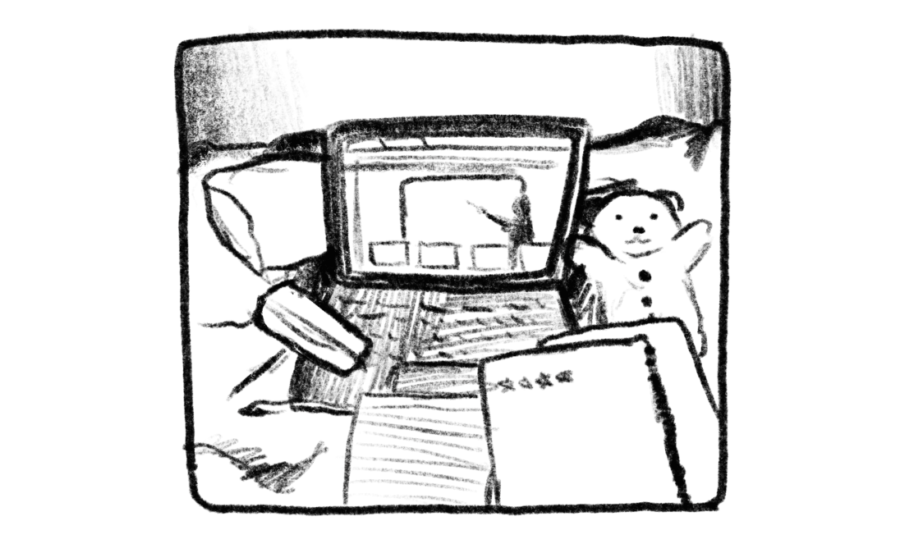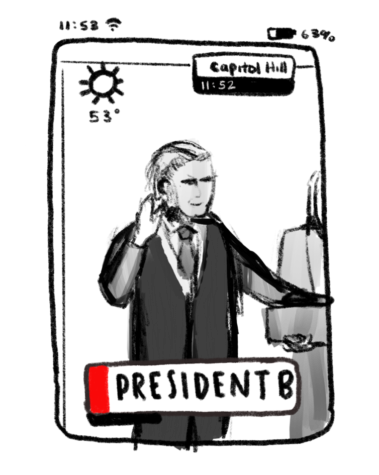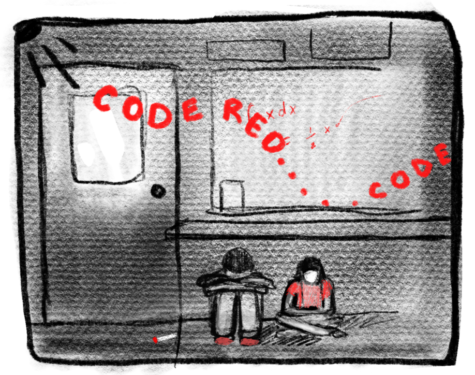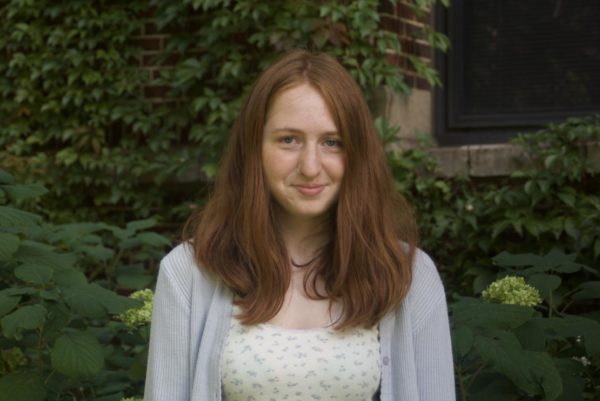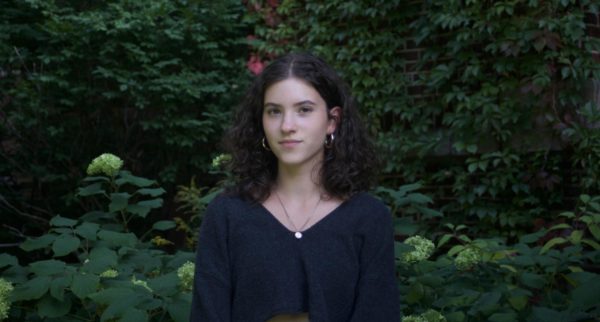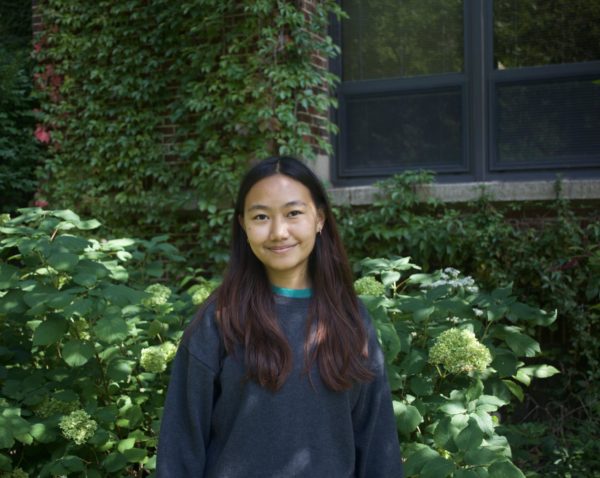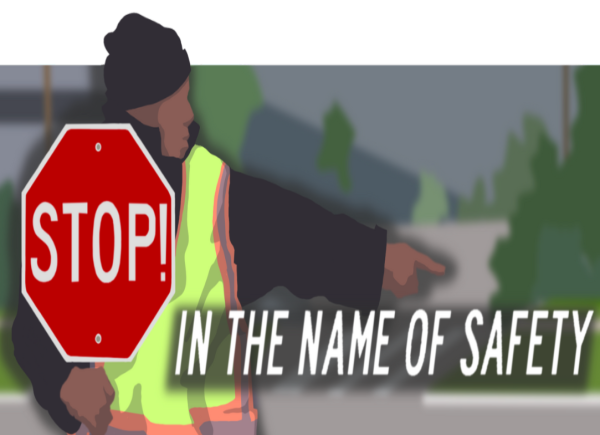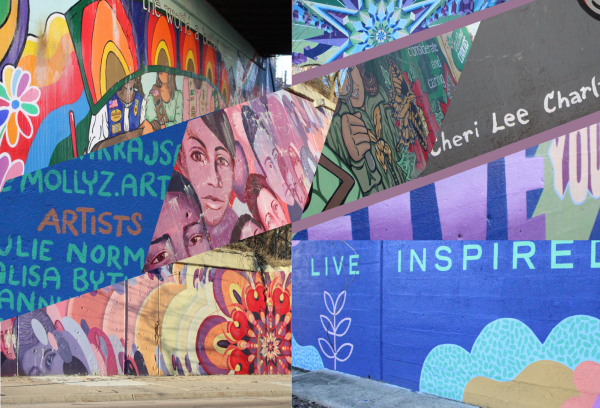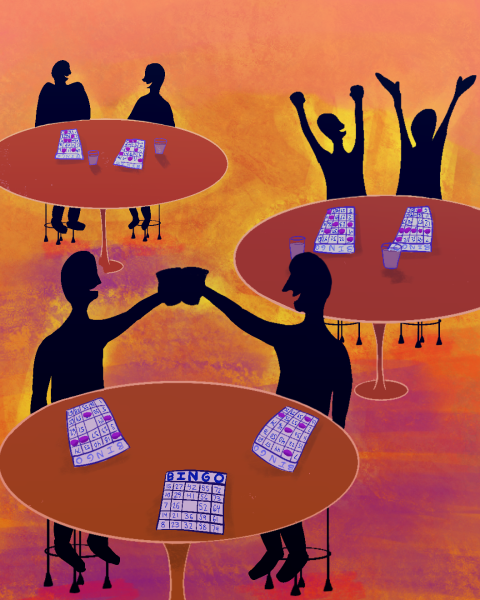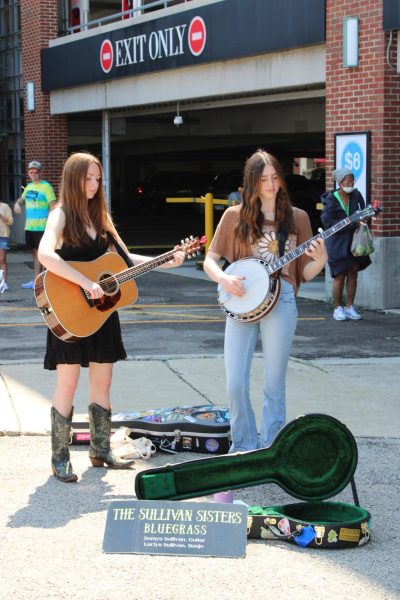Four years in replay: the moments that shaped the Class of 2023
On March 12, 2020, ETHS closed due to the COVID-19 pandemic: a shutdown that was originally supposed to be two weeks. Two weeks became two months, which became almost two years of quarantine.
May 11, 2023
As graduation caps fly into the air on May 21, four years accumulate into a single moment. 902 students gather on stage, diplomas in hand, ready to take the next step. Throughout its time at ETHS, the Class of 2023 not only had to navigate a typical experience of first dates and standardized tests, but years of isolation and political unrest. An unconventional high school experience certainly, these students dealt with disjointed learning schedules and social precariousness. But in this moment, celebration and community are all that fill the Welsh Ryan Arena.
In 2019, the Class of 2023 entered ETHS for the first time. Almost one thousand eager students flooded the halls, entering the fluorescently-lit classrooms and chatting excitedly. They were ready to explore high school to the fullest; many joined sports, clubs and other extracurriculars. These ninth graders looked to the future with hope, confident that 2020 would present a continuation of exciting opportunities. During the entire first semester, and even some of third quarter, this would prove to be true.
For current senior Heath Grossman, ETHS Theater offered a new and exciting opportunity to engage with a new community.
“I started off in the freshman/sophomore fall show ‘Love Sick’ with Ms. Lonnie and Mr. Gray as my directors, which was like the perfect intro into ETHS theater…there were upperclassmen, so it was a good environment for freshmen. It was also a great introduction to the people who I would end up growing relationships with over the next four years,” Grossman said.
Fall moved into winter, and winter into the beginnings of a cold midwestern spring. As the stress of third quarter weighed on the shoulders of these first time high school students, an unexpected future awaited as they prepared for spring break.
On March 12, 2020, ETHS closed due to the COVID-19 pandemic: a shutdown that was originally supposed to be two weeks. Two weeks became two months, which became almost two years of quarantine. Activities were canceled, clubs were put on hold and classes made their best attempt at moving to virtual Zoom screens. Students’ bedrooms became their classrooms, and walks around neighborhoods replaced gym class.
Current senior Francesca Mereu, who joined the tennis team during her freshman year was left without the physical community she had built that fall. She, like many others, was looking forward to her 2020 season when the world turned upside down during lockdown. However, Mereu turned her passion from a loss to a gain during the pandemic.
“Having something to do every fall was really important to my experience. I knew I was going to hang out with the tennis people every day, and the physical activity was very good for not only my physical health but my mental health too. Especially during COVID, just having an escape was so important,” she said.
In terms of changes to education, students participated in e-learning over zoom, turning in work over Google Classroom rather than in class.
“I hated e-learning. I’m so much more grateful for every in-person experience that I have,” Grossman said. “I tried to realize what I didn’t have [during isolation] and how it affected me so much. And what I love, like theater and how I couldn’t do it for literally a year.”
“It wasn’t a great experience, because it was my first time waking up and doing something consistently, and I got into really bad habits, and then those really bad habits affected my grades poorly. So then, it just didn’t go well, and I had to stop myself during one of the semesters and talk to myself seriously and be like, I have to get this done after turning this in. I have to do better if I want to progress,” senior Eric Kasule said.
The COVID-19 lockdown was jarring for these students, who had just worked through the transition from middle to high school, only to be denied a real freshman year.
“These seniors, their whole high school career was affected by COVID. They were shut when they were freshmen that spring. And so, every single year has been massively affected,” senior English teacher Liz Shulman said.
In the midst of adapting to quarantine, there was another conflict brewing, one that would leave a lasting impact on not only the Class of 2023, but the entire country.
On May 25, 2020, George Floyd, a 46 year-old father of five, was murdered by Minneapolis police officer Derek Chauvin. After making a purchase at a local convenience store, Floyd was detained by the police and under suspicion of using a counterfeit twenty-dollar bill. Three officers, Chauvin, J. Alexander Kueng and Thomas Lane tried to force Floyd into the squad car, but he resisted, attempting to explain that he was claustrophobic. Chauvin then proceeded to kneel on Floyd’s neck for nine minutes and 29 seconds, ignoring Floyd’s repeated pleas that he was unable to breathe. He was then pronounced dead at a local hospital. This case sparked national outrage, as The Black Lives Matter movement and words “I Can’t Breathe” garnered attention through social media and an eruption of organized protest.
Across the country, thousands of people flooded the streets, demanding justice and police reform. Protestors were often met with tear gas and other weapons, and videos of these interactions appeared all over the news and social media.
“As a Black person, I would see videos or clips on Instagram and TikTok every day. I would try to scroll for fun, and I’d just see a video of this guy, getting beat up or choked out. And it was traumatizing,” senior Ashley Cochrane said.
As videos like these spread on social media, ingenious and performative forms of activism became substitutes for creating real change. Many people posted black squares on their Instagram feeds, took photo shoots at protests and reposted aesthetic infographics to maintain the appearance of being an ally.
“A lot of girls that have called me slurs or said microaggressions to me, I saw them posting and going to rallies and caring about Black people all of a sudden for the clout. Then, we came back to school, and it’s a complete 180,” Cochrane said.
The Class of 2023 entered their sophomore year as no other class had done before: through a computer screen. As COVID-19 persisted across the country, what had once been seen as an extended spring break quickly turned into a substantial shift in the functionality of education at ETHS. For an entire school year, students were met with an array of gray boxes at the start of class, rather than the familiar faces of their peers. Lectures became Edpuzzles, and group work was soon traded in for the awkwardness of break-out rooms. Each day, students found themselves falling deeper and deeper into a never-ending cycle of waking up, logging into Zoom, sitting through a day of class, logging out of Zoom, falling asleep and repeating. Thus, much of the 2020-21 school year was defined by this lack of a typical high school experience.
“COVID I definitely feel was a big part of my [high school] experience; doing school online was different than anything I’ve ever experienced because I just had to sit in my room all day,” Mereu said. “Going to school in person is a lot more eventful. I also lost a year and a half of high school, which really affected my experience. There are so many parts of high school that I missed out on because of COVID.”
Few ETHS seniors went through high school without feeling the polarizing effects of COVID-19. Stuck inside for an entire year of school, dances were canceled, sporting events went without spectators and other formative experiences simply disappeared.
“They missed a Homecoming celebration their sophomore year; they missed going to athletic events. We did have students who tried to [continue these events safely], and the bands and orchestra, they kept going in their own way, but it wasn’t the same experience. They knew it at the time; it was a challenging year,” former Superintendent Dr. Eric Witherspoon said.
Even two years out of e-learning, this lack of socialization continues to have a lingering effect on health and well-being. Unused to the typical ins and outs of building high school friendships, many students instead find solace in technology and media consumption.
“They were denied a traditional high school experience, and I think it played out with all of us. Socially, [it created] mental health issues, [and] it increased addiction to cell phones and social media,” Shulman said. “All of that came out of the pandemic and being stuck at home. Especially during their freshman year, when that year is so important, you’re not used to socializing with others.”
However, not all students submitted to isolation during the pandemic. Rather than fall into bad habits, Cochrane worked diligently to cultivate and maintain relationships with her peers.
They were denied a traditional high school experience, and I think it played out with all of us.” — English teacher Liz Shulman
“I became a lot closer to my friends, because we only hung out with each other because we didn’t want to spread COVID by hanging out with other people,” Cochrane said. “[E-learning] also made me a lot more outgoing. When it comes to talking to people, I’m a lot better at starting conversations and going up to people in the hallway because, on Zoom, you had to work a lot harder to make friends and meet new people.”
The pandemic also saw the rise of what was commonly referred to as ‘quarantine hobbies.’ Some students took on baking, others learned a new language. Regardless, few came out of the pandemic the same person they were before.
“COVID changed me a lot. Being in quarantine was the most amount of time I have ever spent by myself. I was always a very busy and active person before, and I still am, but I also learned the value of being alone,” Mereu said.
In fact, according to a study done by LendingTree in April of 2021, 76 percent of Gen Zers started a new hobby during the pandemic—ETHS students included.
“It gave me less time in school, which gave me more time to figure out who I am as a person and what I wanted to do with my life. Because in high school, we usually don’t have time to really think about what I want to do and what I like to do. I felt a lot less pressure to do things because my parents or friends wanted me to do because I had all this free time,” Cochrane said. “It was very low-stress for me too. I could take a drive and go for a walk, or skateboard or ride the train to a random place and just explore.”
For student-athletes in particular, this influx of free time allowed for a cultivation of athletic prowess. While most sports seasons initially went unplayed, students were, instead, able to take that time to enhance their personal performances.
“When COVID hit, I was very unmotivated as a student and as an athlete. COVID gave me the chance to work on myself and push my boundaries. I got really into running during COVID. I went from a place where I couldn’t run for five minutes to being able to run eight miles,” says senior Oli Pitman. “COVID changed my high school experience by giving me time to work on myself and push my mental limits.”
Eight months into the 2020-21 school year, there appeared to be no end in sight to this era of Zoom classes and quarantine. However, on April 14, ETHS began its transition to a hybrid instructional model. For the first time in over a year, the Class of 2023 stepped into the building for in-person, face-to-face learning.
“Sophomore year was primarily completely off site, except for those who came at that last quarter for hybrid, but even that was not the normal experience. It was a very empty school,” Witherspoon said.
While most students were excited to be back, education at ETHS was still far from a pre-pandemic normal. Classes never contained more than a few people at a time, and teachers primarily utilized Zoom to instruct—forcing even in-person learners to be logged on to the virtual classroom at all times.
“I feel like that didn’t really happen. Like, that just was not a real thing that we experienced, I think partly because we would come in, and then just sit on the Zoom in a room. And it was, I don’t know, it was nice, because I was out of my house, but it was so strange.”
Throughout these social and educational developments, the 2020 election was underway, ultimately marking an end to Trump-era politics. On November 24, following the final confirmation of votes in Joe Biden’s favor, cars could be heard honking on every street in Evanston, as residents celebrated over the country’s shift in values.
“When Joe Biden was elected in 2021, I was very supportive of most of his beliefs and his promise to lead our country to become a more sustainable one. Seeing some of the actions that have taken place during his presidency like the support for the Willow Project has educated me as a young voter on the importance of holding public officials accountable for their promises,” senior Oli Pitman said.
In a city where over 90% of voters cast their ballots for Biden, it was no question that this transfer of power would be widely appreciated by Evanston residents. Yet, despite Biden’s popularity in some parts of the country, not all shared the same sentiment.
January 6, 2021 started off like any other day of the 2020-21 school year. At 9:00 A.M., students logged into their Zoom calls for their first block class, expecting simply another day of school. However, just three hours later, the day was flipped upside down, as the country’s former president incited a riot of more than 2,000 people on the nation’s Capitol Building.
“I was in my business law class, and my teacher showed us a video. And it was just so scary because they incited a riot on the Capitol building, which never happened before,” Cochrane said. “He asked us what we think about what was happening, and I think that if it was a group of people of color, they would be shot and killed. It really showed me how warped in white supremacy the world is. White people are never put to the same standards.”
Police officers and news reporters were assaulted, elected officials hid for their lives and much of the building was destroyed by vandalism. Since then, over 1,000 people have been prosecuted for their involvement in the January 6 insurrection. However, for many students, this event was merely the tip of the iceberg of Trump’s impact on the country at large.
“I saw it coming. I didn’t think it was that big of a surprise. There were a lot of signs beforehand that showed that it was going to come,” senior Eric Kasule said. “The President was not a good president. There were a lot of things that he did that would rile up a lot of people. So when it did happen, I was just kind of like, ‘What now?’”
Ultimately, the 2020-21 school year was hard on almost everyone. Spending so much time on Zoom was difficult mentally, socially, and educationally. Students were stripped of their fundamental sophomore year experiences and thrown into an unfamiliar world, which would leave many of them permanently changed.
“I think [the pandemic] has had a profound impact. I think that we will not know from the years before the impact. I think it really, in some ways, it’s going to have a lifelong impact. When you’ve gone through a pandemic and you’re any age, but you’re a teenager, and you’re in very important developmental years of your life. And all of the societal things that we have within this country are literally ripped away,” Witherspoon said.
“Fortunately, I think that our seniors are resilient, and I think that they have really been able to get back into the swing of their academics. Many of them really put their best into the era.”
Luckily for the class of 2023, e-learning appeared to be a thing of the past heading into the 2021-22 school year, but life was still far from normal.
In the fall of 2021, the Class of 2023 had the unique experience of stepping into ETHS for the first time—for the second time. Just like when they were freshmen, the entire grade entered a school filled with unfamiliar—now masked—faces and a different environment than they had grown accustomed to.
“It was weird [coming back to ETHS]. I remember being so worried that I would forget the school and get lost. I hadn’t been there in so long,” Mereu said.
Along with Mereu, most other Class of 2023 students had been away from the building for more than a year. While the reintroduction of in-person learning marked a move toward normalcy, in reality, few things at the school had truly returned to a pre-pandemic state. Students and staff were still required to wear masks at all times, other than while eating or drinking, and social distancing was strictly enforced.
“I thought so much about them when they came back as juniors because in my mind, it was like, they’re finally going to start to experience the full ETHS experience and, and thank goodness they’ve had their junior and senior year here on site at the high school,” Witherspoon said.
Along with these pre-emptive measures, students were required to take COVID-19 tests weekly. These tests, conducted by the University of Illinois’ SHIELD program, consisted of students sitting in a large room with their peers, while they filled small test tubes with spit to turn in to a health professional. Soon, this process became the new normal.
“It was kind of interesting. Just being in like, going from gym, and then having to sit in a gym and do the COVID testing. I wouldn’t say it was like a bad experience; it was like a routine,” senior Aniah Roddy said. “Every other Thursday, I would have to go into the gym, and we wouldn’t work out before, for some reason, and then we’d go down there, and then just do the COVID testing, and then come back upstairs. So, at first it was kind of weird, but it was what we needed to do. But it just turned into a routine.”
“I didn’t mind them at all; I actually appreciated them because it made me feel so much more safe from COVID that the school was taking precautions to try to get those who were asymptomatic and sick quarantined as soon as possible,” senior Britza Ruiz said.
As students slowly got used to the odd routine that was SHIELD testing, they also became comfortable with other aspects of post-quarantine ETHS. The Class of 2023 returned to their classes and extracurriculars, a transition that would’ve been incredibly difficult had it not been for the kindness and support of ETHS staff members.
“Ms. Lane’s Spanish class was one of the best classes I ever took…she realized what needed to be changed and realized that everyone was kind of confused at first [when we came back]. She was a supporter first, and then a teacher,” Grossman said.
Within this new sense of normality came a return of pep rallies and school dances. On Oct. 1, 2021, the senior courtyard was packed with students across grade levels for ETHS’ first Homecoming dance since the pandemic.
“It was outside and kind of interesting. They tried their best,” Roddy said. “For me, freshman year was where I had the most fun because I was new to the school, and I feel like with this homecoming, it was more more exciting for the sophomores and seniors, because the sophomores had never really been at the high school, and then the seniors, it was their last year, so they wanted to live it up. But I guess for the juniors, it was just kind of like you’re there, but it was fun.”
December 16, 2021 marked yet another change to the routine these seniors had grown accustomed to. Just minutes into the second block of the day, as students were bent over their chromebooks writing essays, taking quizzes or doing class assignments, an announcement was made: ETHS would be going into a soft lockdown—nothing the school hadn’t experienced before. While these same students continued on with their day, dreading little more than the possibility of remaining in the classroom during their lunch periods, suddenly, an alarm blared out of the intercom. Now, the school was going into a hard lockdown.
“For so long, school shootings and gun violence were just fears for me, but then the whole lockdown made it real. It made me realize that these aren’t just isolated events…they happen everywhere, even my home and somewhere I typically feel safe,” Mereu said.
Throughout the school, students were hidden in closets and under desks. Videos spread from classroom to classroom of SWAT members with loaded assault weapons. Old news articles began to resurface, causing students and staff members alike to believe an active shooter was in the building. Overwhelmed by fear, some students began to climb out of windows, as cars full of anxious caregivers lined the streets by the school. It would be hours before an announcement was made, informing these students that while weapons were found on school grounds, everything was going to be okay. Ultimately, the fear that had defined the day revealed a sad truth: Evanston wasn’t immune to the gun violence epidemic sweeping the country.
“[The lockdown] changed my perspective on our Evanston bubble, because a lot of the time I felt isolated from stuff happening in the rest of the country because we live in a safe haven. The lockdown made me realize that’s not completely true. As much as Evanston is unique in its progressiveness and acceptance, we are still not immune to the issues happening all around America that we consistently see in the news,” Pitman said.
While students feared for their own lives, teachers had to worry about both their personal safety and that of a classroom full of students.
“Well, the first thing I told [the students] was that I’ve lived my life, and so I’m here to protect you. So, do I want something bad to happen to me? No, but, if it comes down to it, I’ll sacrifice myself for you. You have a whole life ahead of you. I’m 50 years old. I’ve lived,” AP European History, Philosophy and African American Studies teacher Dr. Kamasi Hill said. “For me, it was about not so much distracting the students but saying these external concerns should not be the focal point of what’s happening here. We have a classroom community, and we can talk, we can have a conversation and we can let the professionals who handle this stuff handle it.”
Following the lockdown and week of virtual school that succeeded it, on February 28, Illinois lifted the mask mandate, prompting ETHS to go mask-optional.
“I remember seeing people for the first time without their masks, and it was crazy. I didn’t realize how important the bottom part of our faces were,” Mereu said.
This change was symbolic of a slow transition back to some semblance of normalcy at ETHS. The Class of 2023 would return to their senior year without SHIELD testing or mandatory masks, but the invisible scars of the pandemic would not be forgotten.
2022-2023 was inarguably the first and last real year of high school the seniors have had. Walking through H Hall in mid August, seniors were coming back from their first “normal” summer since lockdown—filled with beach days, summer jobs and movie nights. COVID-19 levels in Evanston had finally decreased, with restrictions being lifted across the country. But just as the seniors were adjusting to this new normal, they were forced to accept another reality.
On June 24, 2022, the Supreme Court overturned Roe v. Wade, the landmark case that legalized abortion in the United States. While Illinois currently protects rights surrounding abortion and healthcare, 24 states have banned access to abortion.
For many seniors now about to navigate the American healthcare system on their own, the overturn of Roe v. Wade led many of them to fear for their rights protected under the U.S. Constitution.
“I am disgusted that the people who were responsible for overturning it aren’t seeing how it can leave a huge impact, and it’s honestly because most politicians who were against Roe v. Wade were white rich men, so they don’t see how it affects people of color and those who are low income at a much higher level,” Ruiz said. “They don’t care about the lives of anyone because, if they did, they wouldn’t have overturned it because doing this is going to take so many lives that they are so oblivious to. It hasn’t affected me at all, thankfully, because I live in a state where all the resources I could need for my sexual health are readily available to me.
And for the seniors who were researching and applying to college, concerns surrounding bodily autonomy heightened the stress of an already demanding admissions process. What used to be a decision based on affordability, academics and fit now involved the question of where certain healthcare was available–and legal.
“I was definitely avoiding schools and certainly ruled out Southern schools and schools that have more Republican values, and Roe v. Wade is a part of that,” current senior Natalie Svolos said.
Svolos wasn’t alone: across the country, students were rethinking their dream schools in lieu of having accessible healthcare.
“It definitely had me nervous or scared, for obvious reasons. It did kind of impact my college search because I didn’t want to go to college where I wouldn’t have good benefits, or somewhere where I would be scared to get help,” Roddy said.
Despite these new stressors and challenges, the seniors were thrown into the college admissions process. First semester was filled with late nights, Common App essays, keeping up in AP classes and, for some, their final sports season of high school. As deadlines passed and the first snowflakes fell, seniors tried their best to enjoy their last year of high school. Senior night wins, ETHS summits and music ensemble trips marked the beginning of a return to pre-covid ‘normalcy–’ just months before graduation.
“It definitely was something to get used to because for the entire junior year, you had to wear a mask, until the end of the year, when we were allowed to take them off. But, to go into school without wearing a mask like that, it was refreshing to feel like everything’s getting back to normal again, like how it felt freshman year,” Roddy said. “But, there’s definitely times I remember at the beginning of the school year where I like, ‘Where’s my mask? And I got so scared that I didn’t have it on, but then I remembered we didn’t have to wear one.’”
As the last senior grabs their diploma, high school is over for the Class of 2023 before it truly even started.
“I thought so much about [the current seniors] when they came back, because, in my mind, they were finally going to start to experience the full ETHS experience, and thank goodness they’ve had their junior and senior year here, on site, at the high school,” Witherspoon said. “I hope that the pandemic is becoming a little bit of a distant memory to never be forgotten.”
Paula Hlava and Bridget Baker contributed reporting to this article


